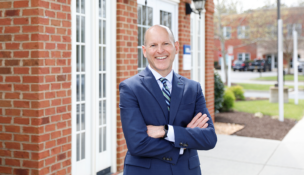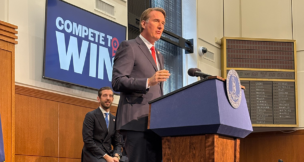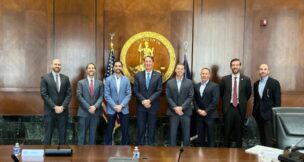High stakes
Either Harris or Trump presidency could have big impacts on Virginia
Mason Adams //September 29, 2024//

Republican presidential candidate former President Donald Trump and Democratic presidential candidate Vice President Kamala Harris shake hands before the start of an ABC News presidential debate at the National Constitution Center on Sept. 10 in Philadelphia. Photo by Associated Press/Alex Brandon

Republican presidential candidate former President Donald Trump and Democratic presidential candidate Vice President Kamala Harris shake hands before the start of an ABC News presidential debate at the National Constitution Center on Sept. 10 in Philadelphia. Photo by Associated Press/Alex Brandon
High stakes
Either Harris or Trump presidency could have big impacts on Virginia
Mason Adams //September 29, 2024//
The 2024 presidential race between Democratic Vice President Kamala Harris and Republican former President Donald Trump carries hefty consequences for Virginia’s economy that will be even more pronounced than in previous elections.
Presidents are limited by the constraints of Congress — particularly if either chamber is held by the opposing party — and the clunkiness of the vast federal bureaucracy. Yet Harris and Trump’s sharply contrasting views could reshape everything from the size of Northern Virginia’s federal workforce and the pace of carbon-free energy transition to a military realignment that could dramatically affect Hampton Roads.
“Given the candidates’ proposals, I think we could be looking at one of the most consequential elections for the Virginia economy in recent decades,” says Robert McNab, director of Old Dominion University’s Dragas Center for Economic Analysis and Policy. “The question is, how much of each candidate’s proposals are actually passable through Congress, and how much could be done through executive action?”
As of early September, a CNN poll of six battleground states showed a tight field, with Harris ahead in Wisconsin and Michigan, Trump ahead in Arizona, and an even split in Georgia, Nevada and Pennsylvania.
In Virginia, a Roanoke College poll in August showed Harris leading Trump 45% to 42%, a lead within the margin of error. The commonwealth isn’t exactly a battleground state like Pennsylvania or Michigan, and Republicans haven’t carried the state in a presidential election since 2004. In September, Axios reported that the Trump campaign appears to be scaling back efforts in Virginia while putting more money and work into Pennsylvania, Michigan and Wisconsin.
No matter which way Virginians vote, experts say, the next presidential administration could have big impacts for federal workers, government contractors, maritime businesses, agricultural enterprises and other industries in the commonwealth.
Federal workforce impact
Perhaps the biggest implication of the presidential race in Virginia involves its more than 140,000 federal workers and their families — the second highest number in the nation, just behind California’s 142,000 federal workers.
If Trump is elected in November, his Agenda47 plan includes several proposals that would dismantle the federal government’s presence in Washington, D.C. Those include shifting numerous agencies and departments to other parts of the country and removing civil service protections for wide swathes of employees to allow their replacement by administration loyalists.
“You’re talking about the potential relocation of tens of thousands of federal employees who work in Washington, D.C., and surrounding areas,” McNab says. “That would be a significant blow to Northern Virginia and would potentially shave tenths of a percentage point off growth for Virginia’s gross domestic product and would also impact income taxes and sales taxes in the commonwealth. Whether it would happen and the scope of how it would happen remains to be determined, but it is certainly within the purview of executive action that could be done.”

Some of that impact might be buffered by the pandemic-era shift to remote work, which already has led some federal employees to relocate from pricey Northern Virginia. Yet Virginia’s economy relies heavily on the federal government. Six of the top 15 congressional districts with the highest concentrations of federal workers in the U.S. are located in Virginia. Many of those are well-paid jobs, offering median pay about twice as high as that of the private sector.
“It’s not just the quantity but the quality of those jobs and how much they support the larger economy,” says Hamilton Lombard, demographer at the University of Virginia’s Weldon Cooper Center for Public Service.
In response to questions about federal workers and defense spending, Jeff Ryer, a Trump campaign spokesperson in Virginia, sent the following statement: “President Trump’s commitment to modernizing and rebuilding our military, as well as his promise to build a missile defense shield, will directly benefit Virginia’s economy. He has made a very specific pledge, highlighted in the 2024 Republican platform, to restore the safety and beauty of our nation’s capital, a change that will benefit the entire region. Five of the 10 wealthiest localities in the United States are in the Washington metropolitan region, which won’t change.”
But U.S. Sen. Tim Kaine, a Democrat running for his third term this year, tweeted in July that Trump’s plan to move 100,000 federal jobs outside of the D.C. region “is unacceptable and would punish the many public servants in our commonwealth who keep basic services running. We can’t afford a second Trump presidency.”
It’s not as easy to predict how a second Trump administration would impact the plethora of federal contracting companies that are a significant part of Northern Virginia’s economy — whether a decentralized federal government would mean more outsourcing of work to contractors or lead to staffing cuts among federal contractors isn’t known.
Hampton Roads, home to Naval Station Norfolk, the world’s largest naval base, also has an economy that relies heavily on military spending, and the presidential election presents divergent futures for that region. Both Harris and Trump back more funding for the military but have different global priorities.
Harris represents a continuation of Biden’s foreign policy, which includes taking a leading role in the NATO alliance as a counter to Russia in Europe. Like Biden, Harris wants to continue providing funding for Ukraine to resist the Russian invasion that began in 2022. But Trump, who has enjoyed a warmer relationship with Russian leader Vladimir Putin, claimed in 2023 that he could solve the crisis “in 24 hours.” Both Harris and Trump have expressed wariness of China, but Trump has taken a more hawkish stance, prompting concerns about military escalation.
Such a shift in focus from Europe to China could potentially affect military operations and defense contractors based in Virginia. The implications could be enormous, but geopolitical shifts inevitably take time to play out and are contingent on factors far beyond the reach of a lone president.
Also, as most political observers know, campaign promises are subject to change, especially when the president’s party doesn’t control Congress. On top of that, the 2024 presidential election has two unusual factors: a new candidate, Harris, who hasn’t rolled out all of her policies or specified how they differ from President Biden’s; and Trump, whose policies and views historically have fluctuated somewhat with polls and popular opinion.
Regarding the Heritage Foundation’s Project 2025 policy blueprint — a 900-page document that was compiled by dozens of powerful Republican thought leaders, including at least 140 former Trump administration officials — it’s difficult to tell how much of it would be enacted in a second Trump term.
Trump himself has made repeated attempts to distance himself from the document, calling some of its restrictions “dismal,” but his campaign’s Agenda47 platform has some similarities to Project 2025, which calls for eliminating up to 1 million federal jobs, slashing funding for the Environmental Protection Agency and rolling back green energy legislation supported by the Biden White House. Also, Project 2025 and Agenda47 both advocate restricting family-based immigration, as well as severely limiting work visas — which would have a major impact on some Virginia industries.
Harris, as vice president, focused on creating a diplomatic solution to address the root causes of migration from Central American countries, including high rates of violent crimes in those nations. She also advocated for a bill that would have lifted visa backlogs for family- and work-based green cards, but it stalled in Congress.
“I guess one of the problems with the current presidential election is there’s a lot of things being tossed out there,” McNab says. “Engaging which things would come to fruition is difficult, because what is rhetoric and what is an actual policy stance seems to be vague for both candidates.”
Energy priorities
The biggest priority for the Virginia Chamber of Commerce and its roughly 31,000 member businesses is to boost the national gross domestic product to at least 3% annual growth, says chamber President and CEO Barry DuVal. In Virginia, that means investing in workforce training, child care and affordable housing.
DuVal calls for an increase in infrastructure investment, particularly around Virginia ports. That includes a second proposed inland port in Southwest Virginia supported by state legislators in the region, and the rail infrastructure needed to link it to the coast.
DuVal also cites energy as a major issue for businesses, particularly the need to bolster the power grid for growing demand from data centers and the cloud-based economy.
“We are very hopeful that candidates will take an all-of-the-above approach [to energy generation] that would include wind and solar and renewables but also natural gas and nuclear,” DuVal says, echoing Gov. Glenn Youngkin’s stance on energy.
Under Biden, Congress passed two major bills investing in infrastructure and clean energy. That legislation included sizable tax credits for wind, solar, battery storage and the shift to electric vehicles. Electric vehicle and battery companies have started construction on factories across the Southeast, mostly in other states.

The Biden White House also approved auctions of leases for offshore wind plots in the Atlantic Ocean; currently, Dominion Energy leases the acreage for the Central Virginia Offshore Wind project under construction off Virginia Beach and also is securing offshore wind farm leases adjacent to that project and in North Carolina.
Harris, if elected, would presumably continue rolling out the investments laid out in the federal infrastructure packages, but Trump has promised he’d claw back the funding and roll back clean energy laws. He has specifically called out electric vehicles, which he views as an economic threat to American vehicle makers, and offshore wind farms, which he pledged to stop on “day one” of his presidency.
In his July speech at Radford University, Trump’s running mate, U.S. Sen. JD Vance, referred to Harris’ support for the “green new scam destroying energy jobs in Virginia and Pennsylvania, and driving up the cost of goods.”
Vance offered a different solution: oil and gas. “It’s simple: Drill, baby, drill,” he said on stage. “It’s not that complicated. We’ve got it right here. Our own workers want to get it out of the ground. Why don’t we just let them? It’ll make our country stronger.”
As of early September, Harris had not clarified her climate and energy stances, but the Democratic platform advocates for continued investment in clean energy, including solar and offshore wind, and strengthening the electrical grid. The Biden administration also issued a rule that would require 56% of all vehicle sales to be electric cars by 2032, up from less than 10% as of 2023.
Immigration questions
Looking broadly, “across the board, Americans care deeply about economic policies, about inflation and the cost of goods, followed by immigration and health care,” says Amanda Wintersieck, associate professor of political science at Virginia Commonwealth University and director of its Institute for Democracy, Pluralism, and Community Empowerment. “We’re seeing both candidates finally talk in a little bit better detail about the issue of inflation and economic issues.”
But immigration is still a flashpoint in the presidential race, with most of the rhetoric focused on the United States’ southern border. Trump regularly attacks Harris’s role in the Biden administration’s border enforcement, while Harris accuses Trump of using his influence to torpedo a bipartisan reform bill negotiated by U.S. Sen. Mitch McConnell, the Republican former Senate majority leader. According to the vice president, Trump got wind of the bill and convinced House Republicans to vote it down because he feared it could hurt his campaign, and Harris vowed to sign the bill if it comes to her desk as president.
Despite the political heat surrounding immigration, it’s more of a workaday issue for businesses in Virginia, from the tech industry to hospitality to agriculture, that need real immigration reform to help them address their workforce demands, DuVal says.
“From an economic perspective, America has to grow its workforce,” DuVal says. “We want workers to be legally imported workers. We don’t have a big enough funnel. Immigration reform is a top priority for us. We’re calling on our federal representatives to find bipartisan support for improving the immigration process.”
That call was echoed by Hobey Bauhan, president of the Virginia Poultry Federation. The state’s poultry farms and facilities in the Shenandoah Valley and Eastern Shore rely heavily on immigrant workers.
“Our nation needs legal immigration for healthy economic growth,” Bauhan says. “We also need secure borders. Unfortunately, the political climate in recent decades seems to preclude bipartisan compromises that would achieve both objectives.”
In particular, the poultry industry would like to see the establishment of a guest worker program geared toward nonseasonal employment.
“That would allow guest workers to stay in the United States for longer periods of time to address nonseasonal agricultural needs, such as poultry, which is year-round,” Bauhan says. But, he notes, “it tends to be polarizing and difficult to get enough people on the same page and get it across the finish line.”
Trade and the port
Both Harris and Trump contend they’d do a better job than their opponent in leading the U.S. economy to new heights, and a stronger economy would lift individual industries.
That’s the case at the Port of Virginia.
“More than anything, for us, what affects trade is the economy,” says Joe Harris, the port’s spokesperson. “Right now, we have a very strong dollar. We’re able to buy more abroad. The value of our goods going overseas is greater, which makes it harder for people to buy our exports. Our collective ability to purchase is great.”
The American Association of Port Authorities has pushed back on a new 25% tariff on cranes imported from China, an order from the Biden White House that was set to go into effect Aug. 1 with other tariff increases on Chinese-made electric cars, semiconductors and solar cells. However, the increases have been delayed to an uncertain future date, due to industry pushback.
According to a news release, the AAPA is concerned the tariff could cause “grave harm to port efficiency and capacity, strained supply chains, increased consumer prices and a weaker U.S. economy.” At the Port of Virginia, all 27 cranes are manufactured by Chinese state-owned ZPMC, and eight more cranes are on order from the company, set to arrive in December and next year.
Both Harris and Trump have expressed support for tariffs to some degree. A Harris spokesperson said in a statement to The New York Times that Harris would “employ targeted and strategic tariffs to support American workers, strengthen our economy, and hold our adversaries accountable.” The Biden administration kept some of Trump’s tariffs on China and even proposed an increase.
Trump, however, has proposed much higher tariffs on most imports, up to 60% on Chinese products — a position Harris has called a “Trump tax” that would cost middle-class families almost $4,000 a year. Economists say that may be a bit overblown, suggesting the true cost to families may rise to $2,600 a year, according to a USA Today article.
“President Trump’s commitment to make America the dominant energy producer in the world, strengthen and modernize our military, and roll back the Biden-Harris administration’s oppressive regulatory burden on our businesses and family farms will supercharge Virginia’s economy,” his Virginia spokesperson said in an email to Virginia Business.
Port spokesperson Harris was careful to distance the port from partisan politics.
“We try to stay outside the political fray,” he says. “We want to live and do business with whoever is in control of the White House and the governor’s office. More than anything outside of politics, the greatest influence is the economy.”
He does, however, note that potential issues also could arise “if someone in the White House wants to enact tariffs, or all of a sudden we find ourselves in a trade war.”

















